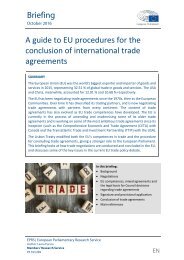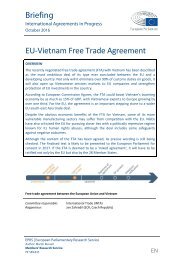Comprehensive Economic and Trade Agreement (CETA) with Canada
2iQ3UOo
2iQ3UOo
Create successful ePaper yourself
Turn your PDF publications into a flip-book with our unique Google optimized e-Paper software.
EPRS<br />
<strong>Comprehensive</strong> <strong>Economic</strong> <strong>and</strong> <strong>Trade</strong> <strong>Agreement</strong> <strong>with</strong> <strong>Canada</strong><br />
Article 21.2 further clarifies that 'a Party is not required to enter into any particular<br />
regulatory cooperation activity, <strong>and</strong> may refuse to cooperate or may <strong>with</strong>draw from<br />
cooperation'. The chapter foresees a 'Regulatory Cooperation Forum (RCF)' co-chaired by<br />
senior representatives of both contracting parties. Dialogues <strong>and</strong> bilateral cooperation in<br />
the areas of biotechnology, trade in forest products <strong>and</strong> raw materials ( Chapter 25),<br />
among others, will also be co-chaired by both parties. The <strong>CETA</strong> Joint Committee, cochaired<br />
by the Canadian Minister for International <strong>Trade</strong> <strong>and</strong> the EU <strong>Trade</strong> Commissioner,<br />
will assemble representatives from both partners, to 'supervise <strong>and</strong> facilitate the<br />
implementation <strong>and</strong> application' of the agreement <strong>and</strong> oversee 'the work of specialised<br />
committees <strong>and</strong> other bodies established under <strong>CETA</strong>' (Chapter 26).<br />
Stakeholders' views<br />
This section aims to provide a flavour of the debate <strong>and</strong> is not intended to be an exhaustive account of all<br />
different views on the agreement. Additional information can be found in related publications listed under<br />
‘EP supporting analysis’ <strong>and</strong> ‘other sources’.<br />
<strong>CETA</strong> has given rise to lively public debate. Some of the criticisms are directed specifically<br />
at this agreement, others seem to be more concerned <strong>with</strong> the Transatlantic <strong>Trade</strong> <strong>and</strong><br />
Partnership (TTIP) currently being negotiated <strong>with</strong> the USA. Some regard <strong>CETA</strong> as a kind<br />
of 'Trojan horse' mechanism for US companies to take advantage of <strong>CETA</strong> through their<br />
Canadian subsidiaries <strong>and</strong> therefore would like to 'stem the tide' against all transatlantic<br />
trade <strong>and</strong> investment agreements. Others, like the INTA chair, argue that <strong>CETA</strong> should be<br />
judged on its own account, or stress the history of common values between the two<br />
partners <strong>and</strong> their similar views on the role of government in the economy.<br />
Some commentators dispute the positive effects of <strong>CETA</strong> as modelled by the official<br />
impact assessment. Nevertheless, the Commission points to the very positive<br />
development of European exports, five years after the Free <strong>Trade</strong> <strong>Agreement</strong> <strong>with</strong> South<br />
Korea had been put in place, as well as the strong EU position in international trade in<br />
services, the area where, given the already quite low tariffs on most goods, significant<br />
economic opportunities are to be expected.<br />
Criticisms are concentrated on provisions on regulatory cooperation, trade in services,<br />
investment protection, sustainable development <strong>and</strong> their potential influences on,<br />
among others, workers’ <strong>and</strong> social rights, consumer <strong>and</strong> environmental protection,<br />
democratic control <strong>and</strong> the ability of federal <strong>and</strong> local governments to regulate in the<br />
public interest. Similar concerns are voiced on both sides of the Atlantic. The debate also<br />
has a more general, fundamental dimension about the way trade agreements are<br />
currently approached <strong>and</strong> negotiated.<br />
Regulatory cooperation. Opponents fear that possible future harmonisation <strong>and</strong> mutual<br />
recognition of rules could lead to the erosion of high European st<strong>and</strong>ards in consumer,<br />
health <strong>and</strong> environmental protection. As the parties may by mutual consent invite other<br />
interested parties to participate in the meetings of the Regulatory Cooperation Forum,<br />
opponents to <strong>CETA</strong> fear the possibility that representatives of industrial interests could<br />
make their case in the very early stages of the regulatory process <strong>and</strong> hence influence<br />
regulation very effectively. Similarly, the 'Dialogue on Biotech Market Access Issues'<br />
(Article 25.2) is seen as a threat to strict rules on food <strong>and</strong> feed containing genetically<br />
modified organisms (GMOs) , eroding the precautionary principle as the basis for the<br />
European approach to regulation. The Commission, however, argues that <strong>CETA</strong> will not<br />
affect EU rules on food safety or the environment, <strong>and</strong> that the Regulatory Cooperation<br />
Forum (RCF) will set the stage for voluntary cooperation, but will not be able to change<br />
Members' Research Service Page 7 of 11




